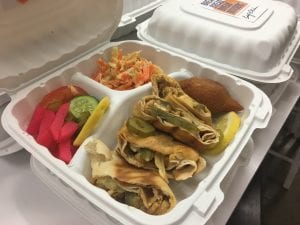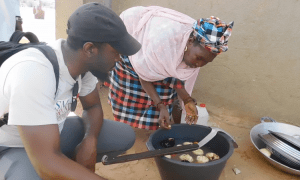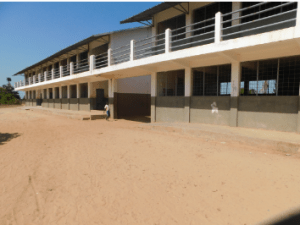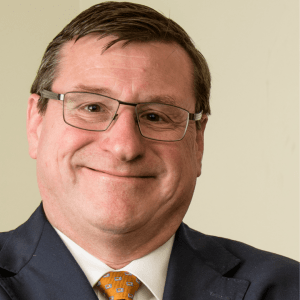 Break Bread, Break Borders (BBBB) is a catering company with a twist. BBBB hires women who came to Dallas as refugees and equips them with the tools to thrive in a new country. Not only does BBBB help build a necessary sense of community among women who have lost nearly everything in their home countries, but BBBB also facilitates a discussion about immigration in the United States.
Break Bread, Break Borders (BBBB) is a catering company with a twist. BBBB hires women who came to Dallas as refugees and equips them with the tools to thrive in a new country. Not only does BBBB help build a necessary sense of community among women who have lost nearly everything in their home countries, but BBBB also facilitates a discussion about immigration in the United States.
“A refugee is someone who has been forced to flee his or her country because of persecution, war, or violence. A refugee has a well-founded fear of persecution for reasons of race, religion, nationality, political opinion, or membership in a particular social group. Most likely, they cannot return home or are afraid to do so. War and ethnic, tribal and religious violence are leading causes of refugees fleeing their countries.” -United Nations High Commissioner for Refugees.
BBBB founder Jin-Ya’s story can be explained like a braid. Different aspects of her life were prominent at different points. These different threads twisted together in 2016 to form BBBB. The five threads that makeup Jin-Ya’s story are: immigration, food, art, loss, and action.
Thread one: immigration
As a child, Jin-Ya moved from Taipai, Taiwan to Tulsa, Oklahoma, with her parents. She had to leave family, friends, and familiarity to follow her parents in pursuit of better opportunities in America.
“I was the kid they started ESL for,” Jin-Ya said with a laugh.
For most people, the phrase “middle school” is unsettling enough. Now imagine navigating the awkward middle school years in a foreign country without an understanding of the language.
While finding her new identity as an American, Jin-Ya’s parents encouraged her to try everything. She had loved art from the age of three, but coming to America made her realize that art was a universal language.
Thread two: art
Jin-Ya explained that in a new country she needed to find her own voice. She witnessed her mom find her voice through cooking. Jin-Ya found that sense of strength and confidence in art. After high school, she pursued an interdisciplinary degree from the University of Texas at Dallas, where she found her passion for photography. After college, Jin-Ya worked for different fashion companies, including Neiman Marcus and JCPenney, as an art director. Today, Jin-Ya works as a Packaging Manager for Fossil.
Jin-Ya has been able to blend her love of photography with her passion for activism. In addition to teaching art classes to people of all ages, she originated the idea of “Rock Your Heart Out,” the Human Rights Initiative’s annual fundraiser.
Thread three: food
Jin-Ya’s aunt and uncle owned a restaurant chain. Her parents worked at the restaurant after they moved to America and eventually purchased their own franchise in Dallas.
Jin-Ya’s parents would always hire immigrants and refugees. At the restaurant, people from all over the world would learn English, how to cook, achieve financial independence, adjust to a new culture, and gain a sense of community. For Jin-Ya and her family, food was never just something to eat. It was a chance to build relationships by finding common ground over a shared meal.

Thread four: loss
Two years ago, Jin-Ya’s mother passed away. As Jin-Ya was working through her grief, she looked back on her mother’s life and saw a woman who believed in kindness. She was a woman who hired displaced people, taught them how to work in the food industry, and sent them on to bigger and better jobs.
Jin-Ya harnessed her grief and turned it into action. That action was BBBB: a vehicle for taking the skills individuals already have and using those skills to facilitate the transition to the American job market and culture. In short, it’s access to success.
Thread five: action
“You’re about to take part in a social justice initiative,” Jin-Ya proclaimed to a group of Teach For America team members who had hired BBBB to cater their lunch.
The social justice initiative was a BBBB lunch. Jin-Ya noted that the food tastes better when you understand the story behind it.
While everyone munched away on Syrian foods, two women stood up to share their stories. Maryam One and Mariam Two. With a smile, Jin-Ya explained that they were so-called because of the order that she met them. Mariam Two stepped forward to share her story with her limited English vocabulary.
In Syria, Mariam Two taught Arabic and lived with her husband and four children. As instability swept over Syria, Mariam knew she had to leave. She walked across the desert with her four children and eventually made it to Jordan. Mariam Two explained that in Jordan, “I want to work, but don’t find it.”
Finally, Mariam Two had the opportunity to come to America. She had to leave her eldest two daughters behind in Jordan because the girls had gotten married. Mariam and her youngest two children took the plunge and crossed the ocean to find their new home in Dallas.
“Everyone smiles here,” Mariam Two observed. “Everyone is so free.”
BBBB aims to empower women both socially and economically. It is a chance to build a community. It is a chance to invest in others. It is a chance to break bread and break borders.
The Hunt Institute is proud to spotlight BBBB, a Hunt Institute Social Entrepreneur, that’s making waves in the DFW area. For more information about BBBB please click here or, email breakbreadbreakborders@gmail.com to learn how to get involved.

Story Contributors
Written by: Anna Grace Carey
Edited by: Maggie Inhofe
Images courtesy of Anna Grace Carey and Jin-Ya Huang.

 40,000 by 2020. These seedlings, combined with the training that will be offered at Hatcher Farms, will ultimately provide the resources and training needed for people in South Dallas to start community gardens and keep them up and running. Hatcher Farms and the MLK Seedling Farm are just Restorative Farms first steps in bringing Dallas closer to having a sustainable local food system.
40,000 by 2020. These seedlings, combined with the training that will be offered at Hatcher Farms, will ultimately provide the resources and training needed for people in South Dallas to start community gardens and keep them up and running. Hatcher Farms and the MLK Seedling Farm are just Restorative Farms first steps in bringing Dallas closer to having a sustainable local food system.














 Break Bread, Break Borders (BBBB) is a catering company with a twist. BBBB hires women who came to Dallas as refugees and equips them with the tools to thrive in a new country. Not only does BBBB help build a necessary sense of community among women who have lost nearly everything in their home countries, but BBBB also facilitates a discussion about immigration in the United States.
Break Bread, Break Borders (BBBB) is a catering company with a twist. BBBB hires women who came to Dallas as refugees and equips them with the tools to thrive in a new country. Not only does BBBB help build a necessary sense of community among women who have lost nearly everything in their home countries, but BBBB also facilitates a discussion about immigration in the United States.
